Premium Only Content
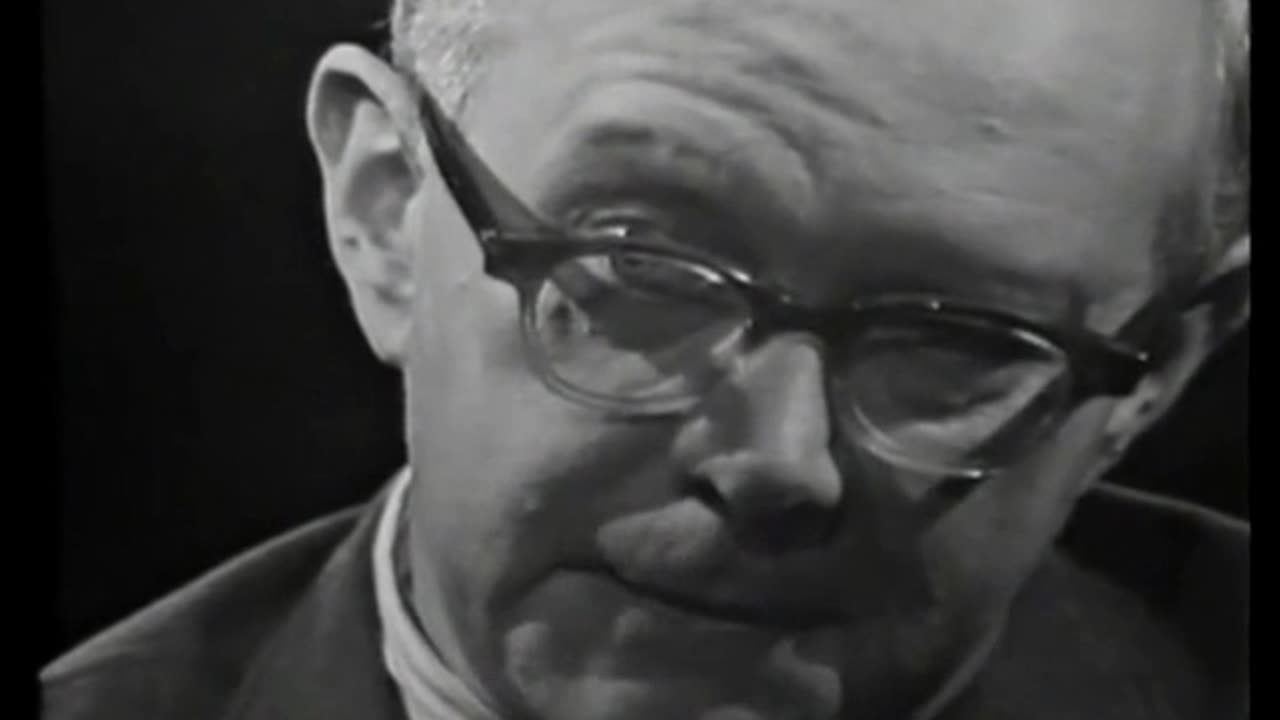
The Dissenters (1967)
Gilbert Avery Harrison (May 18, 1915 – January 3, 2008) was the owner and editor of the influential American magazine The New Republic between 1953 and 1974. Harrison received a George Polk Award in 1964 for his work in revitalizing The New Republic.[1]
During his tenure as the magazine's editor, The New York Times reported, "the magazine was a strong voice on behalf of the civil rights movement. After initially supporting the war in Vietnam, it became a forceful opponent of it, repeatedly criticizing Presidents Lyndon B. Johnson and Richard M. Nixon."[1]
"In 1968, the magazine refused to endorse Hubert H. Humphrey, the eventual Democratic Party nominee, and proposed the creation of a new political party to be headed by Eugene J. McCarthy, the liberal senator from Minnesota who had unsuccessfully sought the presidential nomination," the New York Times further reported."[1]
Biography
He was born in Detroit, Michigan on May 18, 1915, one of three children of Samuel Harrison and Mabel Wolfe.[1]
In 1937 he earned a bachelor's degree in psychology from the University of California, Los Angeles, where he had also been an editor of the university's newspaper, the Daily Bruin.[1] He then worked at the University Religious Conference, which promoted inter-religious cooperation. In that position he met Eleanor Roosevelt, who recruited him as chairman of the youth division of the Office of Civilian Defense in Washington, D.C.
During World War II, he was in the Army Air Forces and served in the Philippines. In 1948, Harrison became national chairman of the American Veterans Committee.[1]
Harrison married Anne Blaine, the granddaughter of Anita McCormick Blaine, in 1951. They had three sons, James, David and Joel, and one daughter, Eleanor.[1]
He was the author of two books, “A Timeless Affair: The Life of Anita McCormick Blaine” (University of Chicago Press, 1979), a biography of his grandmother-in-law; and “The Enthusiast: A Life of Thornton Wilder” (Ticknor & Fields, 1983).[1]
He lived in Scottsdale, Arizona. He died on January 3, 2008, in Phoenix, Arizona.[1]
Billy James Hargis (August 3, 1925 – November 27, 2004) was an American Christian evangelist. At the height of his popularity in the 1950s and 1960s, his Christian Crusade ministry was broadcast on over 500 radio stations and 250 television stations. He promoted an anti-Communist, segregationist message as well as evangelizing, and founded a radio station, monthly newspaper, and a college in Tulsa, Oklahoma to support his ministries. In 1974, several students at his American Christian College accused Hargis of sexual misconduct;[2] however, the Tulsa district attorney found no evidence of wrongdoing. Hargis went into partial retirement, and the college closed in 1977. He continued to publish his newspaper and write books.
Biography
Hargis was adopted by a railroad employee, Jimmie Earsel Hargis, and his wife, Laura Lucille Hargis. By the time the boy was ten, his adoptive mother was in poor health and close to death. The boy had been baptized, and had few pleasures other than the family's daily Bible readings because his family was too poor during the Great Depression to own a radio.[3] When his mother was hospitalized, Hargis promised to devote himself to God if she was spared from death.[4] She recovered and, at age 17, Hargis was ordained in the Disciples of Christ denomination, even before completing Bible college.[3] After a few years, he left his pastorate for a ministry of radio preaching.[5]
In 1943, Hargis entered Ozark Bible College in Bentonville, Arkansas, and studied there for one year. By 1947, when he became concerned about Communism, he was pastor of the First Christian Church in Sapulpa, a city west of Tulsa. He later received his Bachelor of Arts degree from Pikes Peak Bible Seminary in 1957 and a theology degree from Burton College and Seminary in Colorado in 1958.[6]
In 1950, he established an organization called the Christian Crusade. In the mid-1950s, Hargis was closely associated with the evangelist Carl McIntire and in the early 1960s Hargis had developed a close relationship with the resigned United States Army Major General Edwin Walker, but he increasingly went his own way in preaching anti-Communism. His targets included government and popular singers.[5][6] In 1957, the Disciples of Christ denomination withdrew his ordination because he attacked other churches in his anti-Communist crusade. Still, by then, Hargis' radio program was bringing in $1 million annually, and he had established a degree of financial and theological independence.[5] In 1960, the Federal Bureau of Investigation investigated Hargis, suspecting him of being linked to recent bombing attacks on Little Rock public schools and of planning to bomb Philander Smith College. No evidence was found and no charges were filed.[7] On May 31, 1961, Bob Jones University honored Hargis with an honorary Doctor of Laws.[8]
1966 Hargis founded a congregation in Tulsa, Oklahoma called the Church of the Christian Crusade. This was part of a complex of organizations that he founded in Tulsa, including the American Christian College in 1971 and the Christian Crusade monthly newspaper.
Marriage and family
Hargis married Betty Jane Secrest of Sciotoville, Ohio in 1951. They had three daughters and a son, Billy James Hargis II, who died on September 9, 2013, and Bryan Joseph Hargis who died in infancy. His grandson, Billy James Hargis III, was born on May 10, 1989, and currently resides in Houston, Texas.
Career
Hargis' motto was "All I want to do is preach Jesus and save America."[6] Drawing on premillennialist theology, Hargis believed national and world events were part of a cosmic struggle, where the ultimate actors were Christ and Satan. To him communism represented the latter, the United States represented the former. He used this as justification for why the United States should return to what he believed were its founding Christian ideals.
Positions and activities
Hargis preached on cultural issues: against sex education and Communism, and for the return of prayer and Bible reading to public schools, long before the rise of the late 20th century Religious Right. His belief in conspiracy theories led to a belief that the government, the media, and pop culture figures were promoting "communism" in the late 1960s. Hargis' subordinate, Rev. David Noebel, wrote the short work, "Communism, Hypnotism and the Beatles" (1965), which he expanded into "Rhythm, Riots and Revolution" the following year. Both pamphlets were published by the Christian Crusade. Hargis claimed to have written a speech for the infamous anti-communist Senator Joseph R. McCarthy.
Hargis was a member of the John Birch Society and strongly favored segregation, arguing that desegregation violated the Eighth Commandment by allowing the government to steal from one's property.[9] He also accused Dr. Martin Luther King Jr. of being Communist-educated, and published Dr. James D. Bales' anti-King book, The Martin Luther King Story. He opposed the crusades of rival evangelist Billy Graham and endorsed George Wallace in the 1968 presidential election in part because of Republican nominee Richard Nixon's relationship with Graham.[9] Along with his friend Carl McIntire, who was staunchly anti-Catholic,[9] Hargis was one of the most influential people in a movement later known as the "Old Christian Right."[9] However, both Hargis and McIntire lost influence by failing to capitalize on the fact that most American Catholics were staunchly anti-communist.[9]
Hargis addressed audiences with his revival style. He was the author of at least 100 books, including The Far Left, and Why I Fight for a Christian America. In addition, his organization published a pamphlet on sex education, entitled "Is the School House the Proper Place to Teach Raw Sex?", by Gordon V. Drake, the Christian Crusade's educational director.[10]
In 1964, Hargis supported Republican Senator Barry Goldwater in that year's presidential race. However, Goldwater lost the election in a landslide and the Old Christian Right soon began an irreversible downward spiral.[9] A movement known as the New Christian Right, which sought to capitalize on the mistakes of the Old Christian Right by embracing Roman Catholicism,[11] was formed in the late 1970s following the loss of the Vietnam War. Many had feared the defeat in Vietnam would revive the Counterculture of the 1960s.[11]
Red Lion case
On November 25, 1964, Hargis attacked a book and an article called “Hate Clubs of the Air" he believed to be written about him in the Nation magazine by journalist Fred J. Cook in a recorded broadcast heard on WGCB in Red Lion, Pennsylvania.[12] When the radio station refused a right of reply, Cook successfully sued the station who then unsuccessfully countersued the FCC for First Amendment violations. This ultimately lead to a landmark 1969 United States Supreme Court decision Red Lion Broadcasting Co. v. FCC upholding the fairness doctrine.[5][13]
Founding of institutions
In 1950, Hargis founded the Christian Crusade, an interdenominational movement. In 1964, the Internal Revenue Service alleged that Hargis' involvement in political matters violated the terms of the Internal Revenue Code for religious institutions and withdrew the tax-exempt status of the Christian Crusade. Richard Viguerie, a pioneer in using direct mail in the 1970s and 1980s to support conservative movements and their causes, began his career working for Hargis. Viguerie developed direct mail databases to solicit small donations in an average of 2000 mailings a day from a wide field of ideological supporters. At the time, Hargis had reported that the average contribution to his movement was $4, from a constituency of 250,000 donors, and it was receiving $1 million annually.[3]
In association with his Christian Crusade Hargis published the monthly Christian Crusade Newspaper, with a circulation of 55,000, and Weekly Crusade.
He founded the David Livingstone Missionary Foundation, which operated hospitals, orphanages, leprosy villages, medical vans, and mission services in South Korea, Hong Kong, India, the Philippines, and Africa.
Hargis founded American Christian College in Tulsa during 1971 to teach Christian principles and provide an alternative to perceived left-wing and counterculture influences. When asked what was taught there, Hargis said, "anti-communism, anti-socialism, anti-welfare state, anti-Russia, anti-China, a literal interpretation of the Bible, and states' rights."[14]
Concerned with the liberalization of abortion laws following the United States Supreme Court decision in Roe v. Wade, Hargis launched Americans Against Abortion in 1973 with David Noebel as its leader.[15] Noebel went on to author his book Slaughter of the Innocents that was published by the American Christian College within months of the Roe v. Wade decision, and wrote many provocative articles for fundamentalist publications on the abortion issue.
He also started a television show Billy James Hargis and his All-American Kids. It was sold to independent television stations. Students from the college performed in the musical group.[citation needed]
Scandal
In 1974, when Hargis was nearly fifty, he was forced to resign as president of American Christian College because of allegations that he had seduced college students. Two of his students claimed that they had had sexual relations with Hargis—one was female, one was male. Other students corroborated the story. Hargis denied the sexual allegations until his death, both publicly and in his autobiography, My Great Mistake (1985). The account was reported by Time in 1976, along with other alleged incidents at Hargis' farm outside of Neosho, Missouri, and while on tour with his All American Kids musical group.[16] The Tulsa district attorney investigated but never brought charges against Hargis. The local newspapers, the Tulsa World and the defunct Tulsa Tribune, declined to publish the accusations.
When Hargis stepped down as president of American Christian College, he was succeeded by former vice president David Noebel. In February 1975, Hargis tried to regain control of the college but was rejected by its board. By September, he returned to his other ministries. They were said to welcome him after he repented. As Jess Pedigo, president of the David Livingstone Society, said, "There was a danger of bankruptcy."[16] Hargis did not give the deed to the property to the college for months after leaving, which prevented it from gaining regional accreditation. In addition, he withheld the fundraising lists, which all the organizations had previously shared.[16] With declining enrollment after the scandal became public, the college closed in 1977. In 1985 Hargis told a Tulsa reporter, "I was guilty of sin, but not the sin I was accused of."[3]
About 1976, he eventually retreated to his Missouri farm, where he continued to work, resuming a greatly diminished ministry, issuing daily and weekly radio broadcasts. He continued to publish the monthly newspaper, The Christian Crusade Newspaper, and wrote numerous books.
In his final years, suffering from Alzheimer’s disease and a series of heart attacks, Hargis died in a Tulsa nursing home on November 27, 2004, at seventy-nine.[1][3]
Legacy
His son, Billy James Hargis II, continued his ministry until his own death. Hargis' organization and college also established and operated Tulsa radio station KBJH (FM 98.5) in the early 1970s. After the college's closing and the demise of his ministry, the station was sold to Epperson Broadcasting.
Hargis and his church owned and operated a small AM radio station in Port Neches, Texas, from 1980 to the early 1990s. KDLF radio (so named after the David Livingston Foundation) played Southern Gospel Music and religious programming until it was sold around 1993. In the latter days of Hargis' ownership, the radio station had a local marketing agreement to others but was required to play Hargis' hour-long program daily.[citation needed]
Hargis' papers, described as "a goldmine for students of American politics," are held at the special collections department of the University of Arkansas Libraries in Fayetteville.[17]
Portals:
Biography
icon Christianity
icon Politics
flag United States
flag Oklahoma
In popular culture
In the late 1970s, the popular WNBC disk jockey Imus in the Morning would occasionally do a segment where he would present himself as a "holy roller" evangelical Christian preacher named "Reverend Billy Sol Hargis". These brief sermons typically promoted a product which would give some form of spiritual benefit to the buyer of the product. One such product was "Sin Soap" which would purify any part of a person's body which had committed an act of sin. "Reverend Billy Sol Hargis" was an intentional satire of Christian ministers who were more interested in financial gain than the spiritual needs of their followers.[third-party source needed]
References
McFadden, Robert D. (November 29, 2004). "Billy James Hargis, 79, Pastor and Anticommunist Crusader, Dies". New York Times. Retrieved June 15, 2020.
James Stuart Olson, Historical Dictionary of the 1970s, Greenwood Publishing, 1999, p. 187 ISBN 0-313-30543-9.
Adam Bernstein, "Evangelist Billy James Hargis Dies; Spread Anti-Communist Message", Washington Post, November 30, 2004.
Issenberg, Sasha (September 2018). "Barnstorming America". Smithsonian. pp. 40–51.
Michael Carlson, "Billy James Hargis. Rightwing preacher laid low by sexual scandal", The Guardian, December 10, 2004.
Glenn H. Utter & John W. Storey, The Religious Right: A Reference Handbook, ABC-CLIO Ltd 2001, 2nd edition, pp. 6f, 92. ISBN 978-1-57607-212-7.
"The Strange Love of Dr. Billy James Hargis".
Sword of the Lord, June 23, 1961, p. 4.
Kyle, Richard (December 31, 2011). Evangelicalism: An Americanized Christianity. Transaction Publishers. ISBN 9781412809061.
Bruess, Clint E.; Greenberg, Jerrold S. (2008). Sexuality Education: Theory and Practice. Jones & Bartlett Learning. p. 38. ISBN 9780763754952.
Kyle, Richard (December 31, 2011). Evangelicalism: An Americanized Christianity. Transaction Publishers. ISBN 9781412809061. Retrieved April 2, 2018 – via Google Books.
Friendly, Fred W. (March 30, 1975). "WHAT'S FAIR ON THE AIR?". The New York Times. ISSN 0362-4331. Retrieved September 6, 2022.
Lavietes, Stuart (May 4, 2003). "Fred J. Cook, 92, the Author of 45 Books, Many Exposés". The New York Times. ISSN 0362-4331. Retrieved September 6, 2022.
"Billy James Hargis", The Economist, December 16, 2004, accessed May 26, 2011.
"God's Own Party The Making of the Religious Right", p. 117. ISBN 978-0-19-534084-6. Daniel K. Williams. Oxford University Press. 2010.
"The Sins of Billy James" Time, February 16, 1976.
"Hargis Papers Document Birth of Religious Right", University of Arkansas Daily Headlines, June 17, 2009. Internet Archive. Retrieved June 10, 2010.
Further reading
Heather Hendershot, What's Fair on the Air? Cold War Right-Wing Broadcasting and the Public Interest (University of Chicago Press; 2011) 260 pages;covers H.L. Hunt, Dan Smoot, Carl McIntire, and Billy James Hargis.
John H. Redekop, The American Far Right: A Case Study of Billy James Hargis and Christian Crusade, William B. Eerdmans, 1968.
William Frank Buckley Jr. (born William Francis Buckley;[a] November 24, 1925 – February 27, 2008) was an American conservative writer, public intellectual, and political commentator.[1]
Born in New York City, Buckley spoke Spanish as his first language before learning French and then English as a child.[2] He served stateside in the United States Army during World War II. After the war, he attended Yale University, where he engaged in debate and conservative political commentary. Afterward, he worked for two years in the Central Intelligence Agency.
In 1955, he founded National Review, a magazine that stimulated the conservative movement in the United States. In addition to editorials in National Review, Buckley wrote God and Man at Yale (1951) and more than 50 other books on diverse topics, including writing, speaking, history, politics, and sailing. His works include a series of novels featuring fictitious CIA officer Blackford Oakes and a nationally syndicated newspaper column.[3][4]
From 1966 to 1999, Buckley hosted 1,429 episodes of the public affairs television show Firing Line, the longest-running public affairs show with a single host in American television history, where he became known for his distinctive Transatlantic accent and wide vocabulary.[5]
Buckley's views varied, and are considered less categorically conservative than those of most conservative intellectuals today.[6] His public views on race rapidly changed from the 1950s to the 1960s, from endorsing Southern racism to eagerly anticipating the election of an African American to the presidency.[7]
Buckley called himself both a conservative and a libertarian.[8][9] He is widely considered one of the most influential figures in the conservative movement.[10][11][12]
Early life
This article is part of a series on
Conservatism
in the United States
Schools
Principles
History
Intellectuals
Anton Babbitt Bell Bellow Bloom Boorstin Buckley Burnham Chambers Conquest Derbyshire Dolan Durant Eliot Francis George Goldberg Gottfried Hanson Hazony Hoppe Jaffa Kimball Kirk Kirkpatrick Kreeft Kristol (Bill) Kristol (Irving) Kuehnelt-Leddihn Laffer Lasch Lovecraft Lukacs Mansfield Meyer Nisbet Nock Ransom Repplier Santayana Sowell Strauss Viereck Voegelin Washington Weaver
Politicians
Jurists
Commentators
Activists
Works
Parties
Think tanks
Other organizations
Media
Movements
See also
Conservatism portal
flag United States portal
vte
Childhood
William Frank Buckley Jr. was born William Francis Buckley in New York City on November 24, 1925, to Aloise Josephine Antonia (née Steiner) and lawyer and oil developer William Frank Buckley Sr. (1881–1958).[13] His mother hailed from New Orleans and was of German, Irish, and Swiss-German descent, while his father had Irish ancestry and was born in Texas to Canadian parents from Hamilton, Ontario.[14] He had five older siblings and four younger siblings. He moved as a boy with his family to Mexico[15] before moving to Sharon, Connecticut, then began his formal schooling in France, where he attended first grade in Paris. By age seven, the family had moved to England and he received his first formal English-language training at a day school in London; due to the family's movement, his first and second languages were Spanish and French.[16] As a boy, he developed a love for horses, hunting, music, sailing, and skiing, all of which were reflected in his later writings. He was homeschooled through the eighth grade using the Homeschool Curriculum developed by the Calvert School in Baltimore.[17] Just before World War II, around the ages of 12 and 13, he attended the Jesuit preparatory school St John's Beaumont in the English village of Old Windsor.
Buckley's father was an oil developer whose wealth was based in Mexico and became influential in Mexican politics during the military dictatorship of Victoriano Huerta, but was expelled when leftist general Álvaro Obregón became president in 1920. Buckley's nine siblings included eldest sister Aloise Buckley Heath, a writer and conservative activist;[18] sister Maureen Buckley-O'Reilly (1933–1964), who married Richardson-Vicks Drugs CEO Gerald A. O'Reilly; sister Priscilla Buckley, author of Living It Up with National Review: A Memoir, for which Buckley wrote the foreword; sister Patricia Buckley Bozell, who was also an author; brother Reid Buckley, an author and founder of the Buckley School of Public Speaking; and brother James L. Buckley, who became a U.S. senator from New York and a judge of the United States Court of Appeals for the D.C. Circuit.[19]
During the war, Buckley's family took in the English historian-to-be Alistair Horne as a child war evacuee. He and Buckley remained lifelong friends. They both attended the Millbrook School in Millbrook, New York, graduating in 1943. Buckley was a member of the American Boys' Club for the Defense of Errol Flynn (ABCDEF) during Flynn's trial for statutory rape in 1943. At Millbrook, Buckley founded and edited the school's yearbook, The Tamarack; this was his first experience in publishing. When Buckley was a young man, libertarian author Albert Jay Nock was a frequent guest at the Buckley family house in Sharon, Connecticut.[20] William F. Buckley Sr. urged his son to read Nock's works,[21] the best-known of which was Our Enemy, the State, in which Nock maintained that the founding fathers of the United States, at their Constitutional Convention in 1787, had executed a coup d'état of the system of government established under the Articles of Confederation.[22]
Music
In his youth, Buckley developed many musical talents. He played the harpsichord very well,[23] later calling it "the instrument I love beyond all others",[24] although he admitted he was not "proficient enough to develop [his] own style".[25] He was a close friend of harpsichordist Fernando Valenti, who offered to sell Buckley his sixteen-foot pitch harpsichord.[25] Buckley was also an accomplished pianist and appeared once on Marian McPartland's National Public Radio show Piano Jazz.[26] A great admirer of Johann Sebastian Bach,[24] Buckley wanted Bach's music played at his funeral.[27]
Religion
Buckley was raised a Catholic and was a member of the Knights of Malta.[28] He described his faith by saying, "I grew up, as reported, in a large family of Catholics without even a decent ration of tentativeness among the lot of us about our religious faith."[29]
The release of his first book, God and Man at Yale, in 1951 was met with some specific criticism pertaining to his Catholicism. McGeorge Bundy, dean of Harvard at the time, wrote in The Atlantic that "it seems strange for any Roman Catholic to undertake to speak for the Yale religious tradition". Henry Sloane Coffin, a Yale trustee, accused Buckley's book of "being distorted by his Roman Catholic point of view" and stated that Buckley "should have attended Fordham or some similar institution".[30]
In his 1997 book Nearer, My God, Buckley condemned what he viewed as "the Supreme Court's war against religion in the public school" and argued that Christian faith was being replaced by "another God [...] multiculturalism".[31] He disapproved of the liturgical reforms following the Second Vatican Council.[32] Buckley also revealed an interest in the writings and revelations of the 20th century Italian writer Maria Valtorta.[33]
Education and military service
Buckley attended the National Autonomous University of Mexico (or UNAM) until 1943. The next year, upon his graduation from the U.S. Army Officer Candidate School (OCS), he was commissioned as a second lieutenant in the United States Army. In his book Miles Gone By, he briefly recounts being a member of Franklin Roosevelt's honor guard upon Roosevelt's death. He served stateside throughout the war at Fort Benning, Georgia; Fort Gordon, Georgia; and Fort Sam Houston, Texas.[34] After the war ended in 1945, Buckley enrolled at Yale University, where he became a member of the secret Skull and Bones society[35][36] and was a masterful debater.[36][37] He was an active member of the Conservative Party of the Yale Political Union,[38] and served as chairman of the Yale Daily News and as an informer for the FBI.[39] At Yale, Buckley studied political science, history, and economics and graduated with honors in 1950.[36] He excelled on the Yale Debate Team; under the tutelage of Yale professor Rollin G. Osterweis, Buckley honed his acerbic style.[40]
Central Intelligence Agency
Buckley remained at Yale working as a Spanish instructor from 1947 to 1951[41] before being recruited into the CIA like many other Ivy League alumni at that time; he served for two years, including one year in Mexico City working on political action for E. Howard Hunt,[42] who was later imprisoned for his part in the Watergate scandal. The two officers remained lifelong friends.[43] In a November 1, 2005, column for National Review, Buckley recounted that while he worked for the CIA, the only CIA employee he knew was Hunt, his immediate boss. While stationed in Mexico, Buckley edited The Road to Yenan, a book by Peruvian author Eudocio Ravines.[44] After leaving the CIA, he worked as an editor at The American Mercury in 1952, but left after perceiving newly emerging anti-Semitic tendencies in the magazine.[45]
Personal life
In 1950, Buckley married Patricia Buckley—nee Taylor—daughter of Canadian industrialist Austin C. Taylor. He met Taylor, a Protestant from Vancouver, British Columbia, while she was a student at Vassar College. She later became a prominent fundraiser for such charitable organizations as the Memorial Sloan Kettering Cancer Center, the Institute of Reconstructive Plastic Surgery at New York University Medical Center, and the Hospital for Special Surgery. She also raised money for Vietnam War veterans. On April 15, 2007, Pat Buckley died at age 80 of an infection after a long illness.[46] After her death, Buckley seemed "dejected and rudderless", according to friend Christopher Little.[47]
William and Patricia Buckley had one son, author Christopher Buckley.[48] They lived at Wallack's Point in Stamford, Connecticut, with a Manhattan duplex apartment at 73 East 73rd Street: a private entrance to 778 Park Avenue in Manhattan.[49]
Beginning in 1970, Buckley and his wife lived and worked in Rougemont, Switzerland, for six to seven weeks per year for more than three decades.[50]
First books
God and Man at Yale
Buckley (right) and L. Brent Bozell Jr. promote their book McCarthy and His Enemies, 1954.
Buckley's first book, God and Man at Yale, was published in 1951. Offering a critique of Yale University, Buckley argued in the book that the school had strayed from its original mission. One critic viewed the work as miscasting the role of academic freedom.[51] The American academic and commentator McGeorge Bundy, a Yale graduate himself, wrote in The Atlantic: "God and Man at Yale, written by William F. Buckley, Jr., is a savage attack on that institution as a hotbed of 'atheism' and 'collectivism.' I find the book is dishonest in its use of facts, false in its theory, and a discredit to its author."[52]
Buckley credited the attention the book received to its "Introduction" by John Chamberlain, saying that it "chang[ed] the course of his life" and that the famous Life magazine editorial writer had acted out of "reckless generosity".[53] Buckley was referred to in Richard Condon's 1959 novel The Manchurian Candidate as "that fascinating younger fellow who had written about men and God at Yale."[54]
McCarthy and His Enemies
In 1954, Buckley and his brother-in-law L. Brent Bozell Jr. co-authored a book, McCarthy and His Enemies. Bozell worked with Buckley at The American Mercury in the early 1950s when it was edited by William Bradford Huie.[55] The book defended Senator Joseph McCarthy as a patriotic crusader against communism, and asserted that "McCarthyism ... is a movement around which men of good will and stern morality can close ranks."[56] Buckley and Bozell described McCarthy as responding to a communist "ambition to occupy the world". They conceded that he was often "guilty of exaggeration" but believed the cause he pursued was just.[57]
National Review
Buckley founded National Review in 1955 at a time when there were few publications devoted to conservative commentary. He served as the magazine's editor-in-chief until 1990.[58][59] During that time, National Review became the standard-bearer of American conservatism, promoting the fusionism of traditional conservatives and libertarians. Examining postwar conservative intellectual history, Kim Phillips-Fein writes:[60][61]
The most influential synthesis of the subject remains George H. Nash's The Conservative Intellectual Tradition since 1945 .... He argued that postwar conservatism brought together three powerful and partially contradictory intellectual currents that previously had largely been independent of each other: libertarianism, traditionalism, and anticommunism. Each particular strain of thought had predecessors earlier in the twentieth (and even nineteenth) centuries, but they were joined in their distinctive postwar formulation through the leadership of William F. Buckley Jr. and National Review. The fusion of these different, competing, and not easily reconciled schools of thought led to the creation, Nash argued, of a coherent modern Right.
Buckley sought out intellectuals who were ex-Communists or had once worked on the far Left, including Whittaker Chambers, Willi Schlamm, John Dos Passos, Frank Meyer, and James Burnham,[62] as editors and writers for National Review. When Burnham became a senior editor, he urged the adoption of a more pragmatic editorial position that would extend the influence of the magazine toward the political center. Smant (1991) finds that Burnham overcame sometimes heated opposition from other members of the editorial board (including Meyer, Schlamm, William Rickenbacker, and the magazine's publisher, William A. Rusher), and had a significant impact on both the editorial policy of the magazine and on the thinking of Buckley himself.[63][64]
Part of a series on
Conservatism
Variants
Principles
Intellectuals
Johnson Hume Burke More Maistre Bonald Haller Chateaubriand Coleridge Karamzin Savigny Carlyle Newman Tocqueville Cortés Taine Le Bon Belloc Iorga Chesterton Spengler Savarkar Schmitt Jünger Evola Strauss Röpke Oakeshott Burnham Lefebvre Kuehnelt-Leddihn Gómez Dávila Kirk Koselleck Buckley Sowell Mansfield Scruton Hitchens Peterson
Works
Politicians
Organizations
Religion
Personal variants
National variants
Historical background
Related ideologies
Related topics
Conservatism portal
icon Politics portal
vte
Defining the boundaries of conservatism
See also: Conservatism in the United States
Buckley and his editors used National Review to define the boundaries of conservatism and to exclude people, ideas, or groups they considered unworthy of the conservative title.[65] For example, Buckley denounced Ayn Rand, the John Birch Society, George Wallace, racists, white supremacists, and anti-Semites.
When he first met author Ayn Rand, according to Buckley, she greeted him with the following: "You are much too intelligent to believe in God."[66] In turn, Buckley felt that "Rand's style, as well as her message, clashed with the conservative ethos".[67] He decided that Rand's hostility to religion made her philosophy unacceptable to his understanding of conservatism. After 1957, he attempted to weed her out of the conservative movement by publishing Whittaker Chambers's highly negative review of Rand's Atlas Shrugged.[68][69] In 1964, he wrote of "her desiccated philosophy's conclusive incompatibility with the conservative's emphasis on transcendence, intellectual and moral", as well as "the incongruity of tone, that hard, schematic, implacable, unyielding, dogmatism that is in itself intrinsically objectionable, whether it comes from the mouth of Ehrenburg, Savonarola—or Ayn Rand."[70] Other attacks on Rand were penned by Garry Wills and M. Stanton Evans. Nevertheless, historian Jennifer Burns argues, Rand's popularity and influence on the right forced Buckley and his circle into a reconsideration of how traditional notions of virtue and Christianity could be integrated with all-out support for capitalism.[71]
In 1962, Buckley denounced Robert W. Welch Jr. and the John Birch Society in National Review as "far removed from common sense" and urged the Republican Party to purge itself of Welch's influence.[72] He hedged the statement by insisting that among them were "some of the most morally energetic, self-sacrificing, and dedicated anti-Communists in America."[73]
On Robert Welch and the John Birch Society
In 1952, their mutual publisher Henry Regnery introduced Buckley to Robert Welch. Both Buckley and Welch became editors of political journals, and both had a knack for communication and organization.[74] Welch launched his publication One Man's Opinion in 1956 (renamed American Opinion in 1958), one year after the founding of The National Review. Welch twice donated $1,000 to Buckley's magazine, and Buckley offered to provide Welch "a little publicity" for his publication.[74] Both believed that the United States suffered from diplomatic and military setbacks during the early years of the Cold War, and both were staunchly anti-communist.[75] But Welch expressed doubts about Eisenhower's loyalties in 1957, and the two disagreed on the reasons for the United States' perceived failure in the Cold War's early years.[76] According to Alvin Felzenberg's assessment, the disagreements between the two blossomed into "a major battle" in 1958.[74] That year, Boris Pasternak won the Nobel Prize in Literature for his novel Doctor Zhivago. Buckley was impressed by the novel's vivid and depressing depictions of life in a communist society, and believed that the CIA's smuggling of the novel into the Soviet Union was an ideological victory.[76] In September 1958, Buckley ran a review of Doctor Zhivago by John Chamberlain. In November 1958, Welch sent Buckley and other associates copies of his unpublished manuscript "The Politician", which accused Eisenhower and several of Eisenhower's appointees of involvement in a communist conspiracy.[76] When Buckley returned the manuscript to Welch, he commented that the allegations were "curiously—almost pathetically optimistic."[75] On December 9, 1958, Welch founded the John Birch Society with a group of business leaders in Indianapolis.[77] By the end of 1958, Welch had both the organizational and the editorial infrastructure to launch his subsequent far-right political advocacy campaigns.
In 1961, reflecting on his correspondences with Welch and Birchers, Buckley told someone who subscribed to both the National Review and the John Birch Society: "I have had more discussions about the John Birch Society in the past year than I have about the existence of God or the financial difficulties of National Review."[75]
Buckley rule
The Buckley rule states that National Review "will support the rightwardmost viable candidate" for a given office.[78] Buckley first stated the Buckley rule during the 1964 Republican primary election featuring Barry Goldwater and Nelson Rockefeller. The rule is often misquoted and misapplied as proclaiming support for "the rightwardmost electable candidate", or simply the most electable candidate.[79]
According to National Review's Neal B. Freeman, the Buckley rule meant that National Review would support "somebody who saw the world as we did. Somebody who would bring credit to our cause. Somebody who, win or lose, would conservatize the Republican party and the country. It meant somebody like Barry Goldwater."[78]
Starr Broadcasting Group
Buckley was the chairman of Starr Broadcasting Group, a company in which he owned a 20% stake. Peter Starr was president of the company, and his brother Michael Starr was executive vice president. In February 1979 the U.S. Securities and Exchange Commission accused Buckley and 10 other defendants of defrauding shareholders in Starr Broadcasting Group. As part of a settlement, Buckley agreed to return $1.4 million in stock and cash to shareholders in the company. The other defendants were ordered to contribute $360,000.[80] In 1981, there was another agreement with the SEC.[81]
Political commentary and action
Broadcasts and publications
Buckley in 1985
Buckley's column On the Right was syndicated by Universal Press Syndicate beginning in 1962. From the early 1970s, his twice-weekly column was distributed regularly to more than 320 newspapers across the country.[82] He authored 5,600 editions of the column, which totaled to over 4.5 million words.[45]
For many Americans, Buckley's erudition on his weekly PBS show Firing Line (1966–1999) was their primary exposure to him and his manner of speech, often with vocabulary common in academia but unusual on television.[83]
Throughout his career as a media figure, Buckley received much criticism—largely from the American left, but also from certain factions on the right, such as the John Birch Society and its second president, Larry McDonald, as well as from Objectivists.[84]
In 1953–54, long before he founded Firing Line, Buckley was an occasional panelist on the conservative public affairs program Answers for Americans broadcast on ABC and based on material from the H. L. Hunt–supported publication Facts Forum.[85]
Young Americans for Freedom
In 1960, Buckley helped form Young Americans for Freedom (YAF). The YAF was guided by principles Buckley called "The Sharon Statement". Buckley was proud of the successful campaign of his older brother, Jim Buckley, on the Conservative Party ticket to capture the US Senate seat from New York State held by incumbent Republican Charles Goodell in 1970, giving very generous credit to the activist support of the New York State chapter of YAF. Buckley served one term in the Senate, then was defeated by Democrat Daniel Patrick Moynihan in 1976.[86]
Edgar Smith murder case
In 1962, Edgar Smith, who had been sentenced to death for the murder of 15-year-old high-school student Victoria Ann Zielinski in New Jersey, began a correspondence with Buckley from death row. As a result of the correspondence, Buckley began to doubt Smith's guilt. Buckley later said the case against Smith was "inherently implausible".[87] An article by Buckley about the case, published in Esquire in November 1965, drew national media attention:[87]
Smith said he told [friend Don Hommell] during their brief conversation ... on the night of the murder just where he had discarded his pants. The woman who occupies property across the road from which Smith claimed to have thrown the pants ... swore at the trial that she had seen Hommell rummaging there the day after the murder. The pants were later found [by the police] near a well-travelled road .... Did Hommell find them, and leave them in the other location, thinking to discredit Smith's story, and make sure they would turn up?
Buckley's article brought renewed media interest in Hommell, who Smith claimed was the real killer. In 1971, there was a retrial.[87] Smith took a plea deal, and was freed from prison that year.[87] Buckley interviewed him on Firing Line soon thereafter.[88]
In 1976, five years after being released from prison, Smith attempted to murder another woman, this time in San Diego, California.[88] After witnesses corroborated the story of Lisa Ozbun, who survived being stabbed by Smith, he was sentenced to life in prison. He admitted at the trial that he had in fact also murdered Zielinski.[88] Buckley subsequently expressed great regret at having believed Smith and supported him.[88] Friends of Buckley said he was devastated and blamed himself for what happened.[89]
Mayoral candidacy
In 1965, Buckley ran for mayor of New York City as the candidate for the new Conservative Party. He ran to restore momentum to the conservative cause in the wake of Goldwater's defeat.[90] He tried to take votes away from the relatively liberal Republican candidate and fellow Yale alumnus John Lindsay, who later became a Democrat. Buckley did not expect to win; when asked what he would do if he won the race, he responded, "Demand a recount."[91] He used an unusual campaign style. During one televised debate with Lindsay, Buckley declined to use his allotted rebuttal time and instead replied, "I am satisfied to sit back and contemplate my own former eloquence."[92]
During his campaign, Buckley supported many policies that have been perceived as uniquely and unusually progressive. He supported affirmative action, being one of the first American conservatives to endorse a "kind of special treatment [of African Americans] that might make up for centuries of oppression". Buckley also espoused welfare reform to emphasize job training, education and daycare. He criticized the administration of drug laws and in judicial sentencing, and promised to crack down on trade unions that discriminated against minorities. This is considered notable, as his political opponents on the left would have resisted anything that alienated trade union-affiliated voters.[93]
To relieve traffic congestion, Buckley proposed charging drivers a fee to enter the central city and creating a network of bike lanes. He opposed a civilian review board for the New York Police Department, which Lindsay had recently introduced to control police corruption and install community policing.[94] Buckley finished third with 13.4% of the vote, possibly having inadvertently aided Lindsay's election by instead taking votes from Democratic candidate Abe Beame.[91]
Buckley with President Ronald Reagan at Reagan's birthday celebration, 1986
Buckley with Reagan in the Oval Office, 1988
Feud with Gore Vidal
When asked if there was one person with whom Buckley would not share a stage, Buckley's response was Gore Vidal. Likewise, Vidal's antagonism toward Buckley was well known, even before 1968.[95] Buckley nevertheless appeared in a series of televised debates with Vidal during the 1968 Republican National Convention in Miami and the Democratic National Convention in Chicago.[96]
In their penultimate debate on August 28 of that year, the two disagreed over the actions of the Chicago Police Department and the protesters at the convention. In reference to the response of the police involved in supposedly taking down a Viet Cong flag, moderator Howard K. Smith asked whether raising a Nazi flag during the Second World War would have elicited a similar response. Vidal responded that people were free to state their political views as they saw fit, whereupon Buckley interrupted and noted that people were free to speak their views but others were also free to ostracize them for holding those views, noting that in the US during the Second World War "some people were pro-Nazi and they were well [i.e. correctly] treated by those who ostracized them—and I'm for ostracizing people who egg on other people to shoot American Marines and American soldiers. I know you [Vidal] don't care because you have no sense of identification with—". Vidal then interjected that "the only sort of pro- or crypto-Nazi I can think of is yourself" whereupon Smith interjected, "Now let's not call names". Buckley, visibly angered, rose several inches from his seat and replied, "Now listen, you queer, stop calling me a crypto-Nazi or I'll sock you in your goddamn face, and you'll stay plastered."[96]
Buckley later apologized in print for having called Vidal a "queer" in a burst of anger rather than in a clinical context but also reiterated his distaste for Vidal as an "evangelist for bisexuality": "The man who in his essays proclaims the normalcy of his affliction, and in his art the desirability of it, is not to be confused with the man who bears his sorrow quietly. The addict is to be pitied and even respected, not the pusher."[97] The debates are chronicled in the 2015 documentary Best of Enemies.[96]
This feud continued the next year in Esquire magazine, which commissioned essays from Buckley and Vidal on the incident. Buckley's essay "On Experiencing Gore Vidal" was published in the August 1969 issue. In September, Vidal responded with his own essay, "A Distasteful Encounter with William F. Buckley".[98] In it Vidal strongly implied that, in 1944, Buckley's unnamed siblings and possibly Buckley had vandalized a Protestant church in their Sharon, Connecticut, hometown after the pastor's wife sold a house to a Jewish family. He also implied that Buckley was homosexual and a "racist, antiblack, anti-Semitic and a pro-crypto Nazi."[99][100] Buckley sued Vidal and Esquire for libel; Vidal countersued Buckley for libel, citing Buckley's characterization of Vidal's novel Myra Breckenridge as pornography. After Buckley received an out-of-court settlement from Esquire, he dropped the suit against Vidal. Both cases were dropped,[101] with Buckley settling for court costs paid by Esquire, which had published the piece, while Vidal, who did not sue the magazine, absorbed his own court costs. Neither paid the other compensation. Buckley also received an editorial apology from Esquire as part of the settlement.[101][102]
The feud was reopened in 2003 when Esquire republished the original Vidal essay as part of a collection titled Esquire's Big Book of Great Writing. After further litigation, Esquire agreed to pay $65,000 to Buckley and his attorneys, to destroy every remaining copy of the book that included Vidal's essay, to furnish Buckley's 1969 essay to anyone who asked for it, and to publish an open letter stating that Esquire's current management was "not aware of the history of this litigation and greatly [regretted] the re-publication of the libels" in the 2003 collection.[102]
Buckley maintained a philosophical antipathy toward Vidal's other bête noire, Norman Mailer, calling him "almost unique in his search for notoriety and absolutely unequalled in his co-existence with it."[103] Meanwhile, Mailer called Buckley a "second-rate intellect incapable of entertaining two serious thoughts in a row."[104] After Mailer's 2007 death, Buckley wrote warmly about their personal acquaintance.
Associations with liberal politicians
Buckley became a close friend of liberal Democratic activist Allard K. Lowenstein. He featured Lowenstein on numerous Firing Line programs, publicly endorsed his candidacies for Congress, and delivered a eulogy at his funeral.[105][106]
Buckley was also a friend of economist John Kenneth Galbraith[107][108] and former senator and presidential candidate George McGovern,[109] both of whom he frequently featured or debated on Firing Line and college campuses. He and Galbraith occasionally appeared on The Today Show, where host Frank McGee would introduce them and then step aside and defer to their verbal thrusts and parries.[110]
Amnesty International
In the late 1960s, Buckley joined the board of directors of Amnesty International USA.[111] He resigned in January 1978 in protest over the organization's stance against capital punishment as expressed in its Stockholm Declaration of 1977, which he said would lead to the "inevitable sectarianization of the amnesty movement".[112]
Political views
Political candidates
In 1963 and 1964, Buckley mobilized support for the candidacy of Senator Barry Goldwater, first for the Republican nomination against New York Governor Nelson Rockefeller and then for the presidency. Buckley used National Review as a forum for mobilizing support for Goldwater.[113]
Buckley with President Richard Nixon, Henry Kissinger, and Frank Shakespeare in 1970
In July 1971, Buckley assembled a group of conservatives to discuss some of Richard Nixon's domestic and foreign policies that the group opposed. In August 1969, Nixon had proposed and later attempted to enact the Family Assistance Plan (FAP), welfare legislation that would establish a national income floor of $1,600 per year for a family of four.[114]
Buckley greeting President Gerald Ford in 1976
On the international front Nixon negotiated talks with the Soviet Union and initiated relations with China, which Buckley, as a hawk and anti-communist, opposed. The group, known as the Manhattan Twelve, included National Review's publisher William A. Rusher and editors James Burnham and Frank Meyer. Other organizations represented were the newspaper Human Events, The Conservative Book Club, Young Americans for Freedom, and the American Conservative Union.[115] On July 28, 1971, they published a letter announcing that they would no longer support Nixon.[116] The letter said, "In consideration of his record, the undersigned, who have heretofore generally supported the Nixon Administration, have resolved to suspend our support of the Administration."[117] Nonetheless, in 1973, the Nixon Administration appointed Buckley as a delegate to the United Nations, about which Buckley later wrote a book.[117]
In 1976, Buckley supported Ronald Reagan's presidential campaign against sitting President Gerald Ford and expressed disappointment at Reagan's narrow loss to Ford.[118] In 1981, Buckley informed President-elect Reagan that he would decline any official position offered to him. Reagan jokingly replied that was too bad, because he had wanted to make Buckley ambassador to (then Soviet-occupied) Afghanistan. Buckley later wrote, "When Ronald Reagan offered me the ambassadorship to Afghanistan, I said, 'Yes, but only if you give me fifteen divisions of bodyguards'."[119]
Race and segregation
"The central question that emerges ... is whether the White community in the South is entitled to take such measures as are necessary to prevail, politically and culturally, in areas where it does not predominate numerically? The sobering answer is Yes—the White community is so entitled because, for the time being, it is the advanced race."
William F. Buckley Jr., National Review, August 1957[120]
In the 1950s and early 1960s, Buckley opposed federal civil rights legislation and expressed support for continued racial segregation in the South. In Freedom Is Not Enough: The Opening of the American Workplace, author Nancy MacLean states that National Review made James J. Kilpatrick—a prominent supporter of segregation in the South—"its voice on the civil rights movement and the Constitution, as Buckley and Kilpatrick united North and South in a shared vision for the nation that included upholding white supremacy".[121] In the August 24, 1957, issue of National Review, Buckley's editorial "Why the South Must Prevail" spoke out explicitly in favor of temporary segregation in the South until "long term equality could be achieved". Buckley opined that temporary segregation in the South was necessary at the time because the black population lacked the education, economic, and cultural development to make racial equality possible.[122][123][124] Buckley claimed that the white South had "the right to impose superior mores for whatever period it takes to effect a genuine cultural equality between the races".[123][125][126][127] Buckley said white Southerners were "entitled" to disenfranchise black voters "because, for the time being, it is the advanced race."[128] Buckley characterized Blacks as distinctly ignorant: "The great majority of the Negroes of the South who do not vote do not care to vote, and would not know for what to vote if they could."[128] Two weeks after that editorial was published, another prominent conservative writer, L. Brent Bozell Jr. (Buckley's brother-in-law), wrote in the National Review: "This magazine has expressed views on the racial question that I consider dead wrong, and capable of doing great hurt to the promotion of conservative causes. There is a law involved, and a Constitution, and the editorial gives White Southerners leave to violate them both in order to keep the Negro politically impotent."[129][130]
Buckley visited South Africa in the 1960s on several paid fact-finding missions in which he distributed publications that supported the South African government's policy of apartheid.[131] On January 15, 1963, the day after George Wallace, the white supremacist governor of Alabama, made his "Segregation Forever" inaugural address, Buckley published a feature essay in National Review on his recent "South African Fortnight", concluding it with these words concerning apartheid: "I know it is a sincere people's effort to fashion the land of peace they want so badly."[132][133] In his report, Buckley tried to define apartheid and came up with four axioms on which the policy stands, the fourth being "The notion that the Bantu could participate in power on equal terms with the whites is the worst kind of ideological and social romance".[134] After publishing this defense of the Henrik Verwoerd government, Buckley wrote that he was "bursting with pride" over the West German social critic Wilhelm Röpke's praise of the piece.[135]
Politico indicates that during the administration of Lyndon B. Johnson, Buckley's writing grew more accommodating toward the civil rights movement. In his columns, he "ridiculed practices designed to keep African Americans off the voter registration rolls", "condemned proprietors of commercial establishments who declined service to African Americans in violation of the recently enacted 1964 Civil Rights Act", and showed "little patience" for "Southern politicians who incited racial violence and race-baited in their campaigns".[136] According to Politico, the turning point for Buckley was when white supremacists set off a bomb in a Birmingham church on September 15, 1963, which resulted in the deaths of four African American girls.[137] A biographer said that Buckley privately wept about it when he found out about the incident.[137]
However, Buckley disagreed with the concept of structural racism and placed a large amount of blame for lack of economic growth on the black community itself, most prominently during a highly publicized 1965 debate at the Cambridge Union with African-American writer James Baldwin, in which Baldwin carried the floor vote 544 to 164.[138][139][140] In the late 1960s, Buckley disagreed with segregationist George Wallace of Alabama, debating against Wallace's platform on a January 1968 episode of Firing Line.[141][142]
Buckley later said he wished National Review had been more supportive of civil rights legislation in the 1960s.[143] He grew to admire Martin Luther King Jr. and supported the creation of Martin Luther King Jr. Day.[144] Buckley anticipated that the U.S. could elect an African-American president within a decade as of the late 1960s and said such an event would be a "welcome tonic for the American soul" that he believed would confer the same social distinction and pride upon African Americans that Roman Catholics had felt upon John F. Kennedy's election.[145] In 2004, Buckley told Time, "I once believed we could evolve our way up from Jim Crow. I was wrong. Federal intervention was necessary."[136] The same year, he endeavored to clarify his earlier comments on race, saying, "[T]he point I made about white cultural supremacy was sociological." Buckley also linked his usage of the word advancement to its usage in the name NAACP, saying that the "call for the 'advancement' of colored people presupposes they are behind. Which they were, in 1958, by any standards of measurement."[146]
Opposition to antisemitism
During the 1950s, Buckley worked to remove antisemitism from the conservative movement and barred antisemites from working for National Review.[144]
When Norman Podhoretz demanded that the conservative movement banish paleoconservative columnists Patrick Buchanan and Joseph Sobran, who, according to cultural critic Jeffrey Hart, had promulgated a "a neoisolationist nativism tinged with anti-Semitism", Buckley would have none of it, and wrote that Buchanan and Sobran (a colleague of Buckley and formerly a senior editor of National Review) were not antisemitic but anti-Israel.[147]
In 1991, Buckley wrote a 40,000-word article criticizing Buchanan. He wrote, "I find it impossible to defend Pat Buchanan against the charge that what he did and said during the period under examination amounted to anti-Semitism",[148][149] but concluded: "If you ask, do I think Pat Buchanan is an anti-Semite, my answer is he is not one. But I think he's said some anti-Semitic things."[150]
Conservative Roger Scruton wrote: "Buckley used the pages of the National Review to distance conservatism from anti-Semitism, and from any other kind of racial stereotyping. The important goal, for him, was to establish a believable stance towards the modern world, in which all Americans, whatever their race or background, could be included, and which would uphold the religious and social traditions of the American people, as well as the institutions of government as the Founders had conceived them."[151]
Buckley's friendship with Ira Glasser, a Jewish American and former executive director of the American Civil Liberties Union, features in the 2020 film Mighty Ira.[152][153]
Foreign policy
Buckley's opposition to communism extended to support for the overthrow and replacement of leftist governments by nondemocratic forces. Buckley admired Spanish dictator General Francisco Franco, who led the rightist military rebellion in its military defeat of the Spanish Republic, and praised him effusively in his magazine, National Review. In his 1957 "Letter From Spain",[154] Buckley called Franco "an authentic national hero",[154][155] who "above others" had the qualities needed to wrest Spain from "the hands of the visionaries, ideologues, Marxists and nihilists" who had been democratically elected.[156] He supported the military dictatorship of General Augusto Pinochet, who led the 1973 coup that overthrew Chilean president Salvador Allende's democratically elected Marxist government; Buckley called Allende "a president who was defiling the Chilean constitution and waving proudly the banner of his friend and idol, Fidel Castro."[157] In 2020, the Columbia Journalism Review uncovered documents that implicated Buckley in a media campaign by the Argentina military junta promoting the regime's image while covering up the Dirty War.[158]
Regarding the War in Iraq, Buckley stated, "The reality of the situation is that missions abroad to effect regime change in countries without a bill of rights or democratic tradition are terribly arduous." He added: "This isn't to say that the Iraq war is wrong, or that history will judge it to be wrong. But it is absolutely to say that conservatism implies a certain submission to reality; and this war has an unrealistic frank and is being conscripted by events."[159] In a February 2006 column published at National Review Online and distributed by Universal Press Syndicate, Buckley wrote, "One cannot doubt that the American objective in Iraq has failed" and "it's important that we acknowledge in the inner councils of state that [the war] has failed, so that we should look for opportunities to cope with that failure."[160]
Marijuana
Buckley supported the legalization of marijuana and some other drug legalization as early as his 1965 candidacy for mayor of New York City.[161][162] But in 1972, he said that while he supported removing criminal penalties for using marijuana, he also supported cracking down on trafficking marijuana.[163] Buckley wrote a pro-marijuana-legalization piece for National Review in 2004 in which he called for conservatives to change their views on legalization, writing, "We're not going to find someone running for president who advocates reform of those laws. What is required is a genuine republican groundswell. It is happening, but ever so gradually. Two of every five Americans ... believe 'the government should treat marijuana more or less the same way it treats alcohol: It should regulate it, control it, tax it, and make it illegal only for children.'"[164]
Gay rights
Buckley strongly opposed gay marriage, but supported the legalization of homosexual relations.[165]
In a March 18, 1986, New York Times op-ed, Buckley addressed the AIDS epidemic. Calling it "a fact" that AIDS is "the special curse of the homosexual", he argued that people infected with HIV should marry only if they agreed to sterilization and that universal testing—led by insurance companies, not the government—should be mandatory. Most controversially, he wrote: "Everyone detected with AIDS should be tattooed in the upper forearm, to protect common-needle users, and on the buttocks, to prevent the victimization of other homosexuals."[166] The piece led to much criticism; some gay activists advocated boycotting Patricia Buckley's fund-raising efforts for AIDS. Buckley later backtracked from the piece, but in 2004 he told The New York Times Magazine: "If the protocol had been accepted, many who caught the infection unguardedly would be alive. Probably over a million."[167]
Spy novelist
In 1975, Buckley recounted being inspired to write a spy novel by Frederick Forsyth's The Day of the Jackal: "If I were to write a book of fiction, I'd like to have a whack at something of that nature."[168] He went on to explain that he was determined to avoid the moral ambiguity of Graham Greene and John le Carré. Buckley wrote the 1976 spy novel Saving the Queen, featuring Blackford Oakes as a rule-bound CIA agent, based in part on his own CIA experiences. Over the next 30 years, he would write another ten novels featuring Oakes. New York Times critic Charlie Rubin wrote that the series "at its best, evokes John O'Hara in its precise sense of place amid simmering class hierarchies".[169] Stained Glass, second in the series, won a 1980 National Book Award in the one-year category "Mystery (paperback)".[170][b]
Buckley was particularly concerned about the view that what the CIA and the KGB were doing was morally equivalent. He wrote in his memoirs, "To s
-
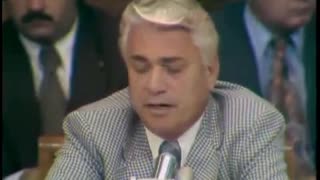 6:37:17
6:37:17
The Memory Hole
16 days agoNixon Impeachment Hearings Day 6 (1974-07-29)
385 -
 25:59
25:59
TampaAerialMedia
1 day ago $0.72 earnedUpdate ANNA MARIA ISLAND 2025
13.1K1 -
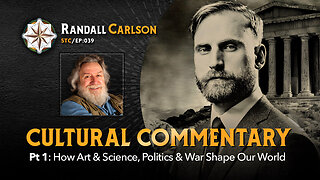 59:31
59:31
Squaring The Circle, A Randall Carlson Podcast
10 hours ago#039: How Politics & War, Art & Science Shape Our World; A Cultural Commentary From Randall Carlson
10.4K2 -
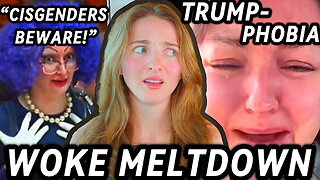 13:21
13:21
Misha Petrov
10 hours agoThe CRINGIEST Thing I Have Ever Seen…
9.2K36 -
 11:45
11:45
BIG NEM
6 hours agoWe Blind Taste Tested the Best Jollof in Toronto 🇳🇬🇬🇭
5.02K -
 15:40
15:40
Fit'n Fire
9 hours ago $0.13 earnedArsenal SLR106f & LiteRaider AK Handguard from 1791 Industries
4.23K1 -
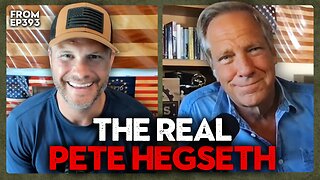 8:34
8:34
Mike Rowe
6 days agoWhat You Didn't Hear At Pete's Confirmation Hearing | The Way I Heard It with Mike Rowe
42.4K19 -
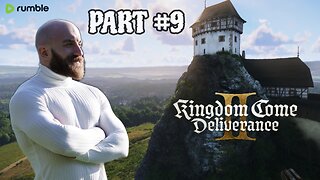 7:13:44
7:13:44
TonYGaMinG
11 hours ago🟢LATEST! KINGDOM COME DELIVERANCE 2 / NEW EMOTES / BLERPS #RumbleGaming
65K4 -
 40:17
40:17
SLS - Street League Skateboarding
4 days agoEVERY 9 CLUB IN FLORIDA! Looking back at SLS Jacksonville 2021 & 2022 - Yuto, Jagger, Sora & more...
110K1 -
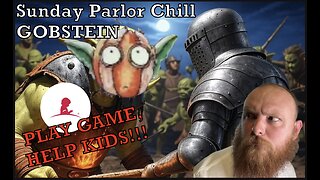 2:00:47
2:00:47
PaddysParlorGames
20 hours agoSunday Parlor Chill: GOBSTEIN
69.2K3